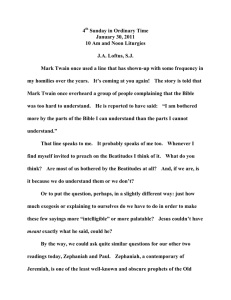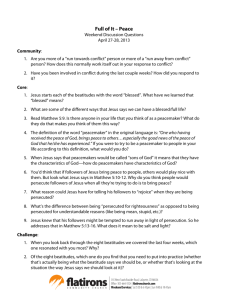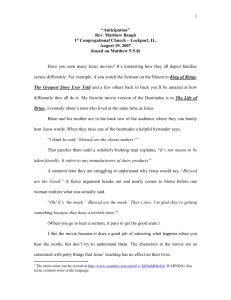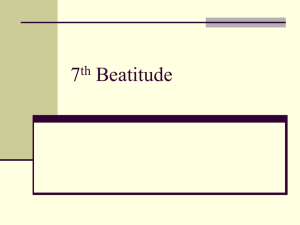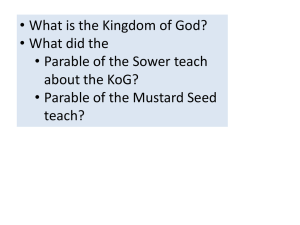4th Sunday in Ordinary Time February 3, 2008 J.A. Loftus, S.J.
advertisement
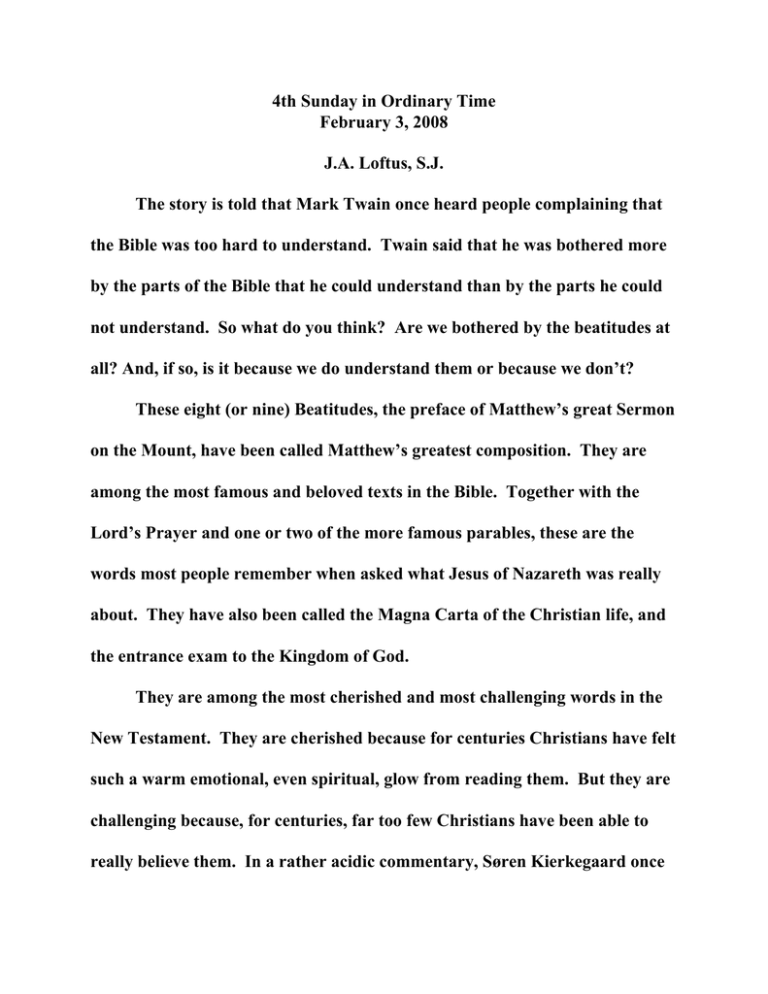
4th Sunday in Ordinary Time February 3, 2008 J.A. Loftus, S.J. The story is told that Mark Twain once heard people complaining that the Bible was too hard to understand. Twain said that he was bothered more by the parts of the Bible that he could understand than by the parts he could not understand. So what do you think? Are we bothered by the beatitudes at all? And, if so, is it because we do understand them or because we don’t? These eight (or nine) Beatitudes, the preface of Matthew’s great Sermon on the Mount, have been called Matthew’s greatest composition. They are among the most famous and beloved texts in the Bible. Together with the Lord’s Prayer and one or two of the more famous parables, these are the words most people remember when asked what Jesus of Nazareth was really about. They have also been called the Magna Carta of the Christian life, and the entrance exam to the Kingdom of God. They are among the most cherished and most challenging words in the New Testament. They are cherished because for centuries Christians have felt such a warm emotional, even spiritual, glow from reading them. But they are challenging because, for centuries, far too few Christians have been able to really believe them. In a rather acidic commentary, Søren Kierkegaard once said of them: “We have no thought of seriously believing Jesus....We enjoy our worldly comforts and we get a faint emotional glow from reading of the Jesus whom we would never be so foolish as to obey.” A bit harsh, but challenging. The Beatitudes genuinely turn upside-down our usual values–even those values we think of as “Christian.” The words are so familiar to most of us that they lose their revolutionary power. These powerful words fall on modern ears like worn knives that have lost their cutting power. The blades lose their edge and may even soothe us rather than cut us. I suggest we try listening this morning as if we have never heard these words before. Imagine yourself hearing them for the first time and try not to “spiritualize” them too much; imagine that you are one of the great crowd Matthew describes on the mountain. Listen again as praise is heaped upon the poor, the mourning, the hungry, the meek, the merciful, the peacemakers, and the persecuted. The words may anger you; they may simply amaze you; they may inspire you. But they will not bore you; they will not be dull words. On hearing them for the first time, people tend to either totally approve, or take a very negative stance, saying something like: “This is a lot of beautiful idealism but it isn’t practical. It won’t work in this kind of world.” Try living the Beatitudes in your workplace. It’s not going to work. It all 2 sounds great on the mountain top, but we all have to come down sometime. As theologian John Shea puts it: “We always return to flat land, back down to earth with a thud. Poverty crushes all the way through, mourning has no comfort, persecution is victory for the persecutors, mercy is limited, peacemaking impossible, and meekness inherits nothing but it’s own refusal to fight back.” The soaring rhetoric of the Sermon on the Mount is stunning drama, but of no real use; it just contradicts the common sense we all know. So where does that leave us? How have you always heard the Beatitudes? How much do you have to re-interpret them, theologize them, spiritualize them in order to try to live them? Are some of you getting angry at me or depressed a bit because I seem to be ruining such a lovely passage? I can’t blame you. But these revered words were never intended to just be a spiritual treatise–to be internalized and idealized as lovely. They were never intended by Matthew or Jesus to be just an ethical injunction either. They were intended to be the incarnated sign of God’s Kingdom on earth–in us. This is what the elusive kingdom actually looks like! The poor in spirit, the hungry, the meek, the peacemakers, the persecuted are supposed to be us! And the hoped-for reward is promised as well. We will then be blessed, happy beyond our wildest dreams. 3 Happiness is an alternate translation for Blessed. It is used by many Bibles, including the beautiful Jerusalem Bible. But the Greek word Matthew uses for “blessed,” is not the usual word for happiness. He uses makarios which is a kind of happiness, but a special kind. It is really being supremely happy, well-off, greatly fortunate, or as one translation has it, “lofty happiness.” Do you suppose this is what modern psychologists are aiming for in their new field called Positive Psychology? The latest book just out is called The How of Happiness. The groundbreaking book a few years back was called Learned Optimism. Is this what Jesus is trying to teach? How to be happy in that psychological sense? I doubt that very much. The kind of happiness Jesus offers in the Beatitudes remains as enfleshed in paradox and mystery as his whole life does. It is a far cry from the mantra: Don’t worry; be happy! Jesus’ “happiness” sounds like it’s going to depress me– sooner or later. But ironically it doesn’t. The paradox of the kingdom again: to gain fuller life, you have to lose it. Listen again to his words sometime today. It is a stunning sermon and the preface to the stunning drama of his own life. “Happy are the poor in spirit, for theirs is the kingdom of heaven. Happy are the meek for they will 4 inherit the land. Happy are the peacemakers for they will be called children of God.” I think I understand Mark Twain better now. I, too, am bothered more by the parts of the Bible I do understand than by the parts I do not understand. Today’s gospel–for better or worse–I do understand. It’s really not that complicated–just that scary. Now I just pray to believe it. And then to try to live it. 5
